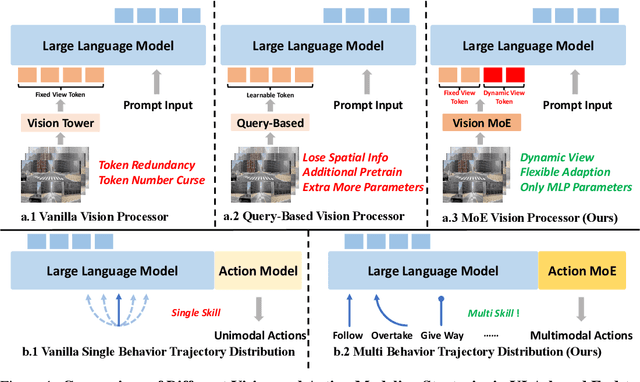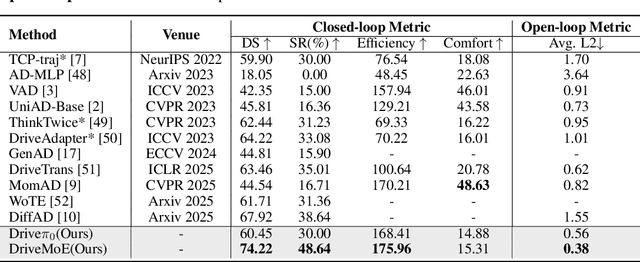Xuekai Zhu
SEMA: Simple yet Effective Learning for Multi-Turn Jailbreak Attacks
Feb 06, 2026Abstract:Multi-turn jailbreaks capture the real threat model for safety-aligned chatbots, where single-turn attacks are merely a special case. Yet existing approaches break under exploration complexity and intent drift. We propose SEMA, a simple yet effective framework that trains a multi-turn attacker without relying on any existing strategies or external data. SEMA comprises two stages. Prefilling self-tuning enables usable rollouts by fine-tuning on non-refusal, well-structured, multi-turn adversarial prompts that are self-generated with a minimal prefix, thereby stabilizing subsequent learning. Reinforcement learning with intent-drift-aware reward trains the attacker to elicit valid multi-turn adversarial prompts while maintaining the same harmful objective. We anchor harmful intent in multi-turn jailbreaks via an intent-drift-aware reward that combines intent alignment, compliance risk, and level of detail. Our open-loop attack regime avoids dependence on victim feedback, unifies single- and multi-turn settings, and reduces exploration complexity. Across multiple datasets, victim models, and jailbreak judges, our method achieves state-of-the-art (SOTA) attack success rates (ASR), outperforming all single-turn baselines, manually scripted and template-driven multi-turn baselines, as well as our SFT (Supervised Fine-Tuning) and DPO (Direct Preference Optimization) variants. For instance, SEMA performs an average $80.1\%$ ASR@1 across three closed-source and open-source victim models on AdvBench, 33.9% over SOTA. The approach is compact, reproducible, and transfers across targets, providing a stronger and more realistic stress test for large language model (LLM) safety and enabling automatic redteaming to expose and localize failure modes. Our code is available at: https://github.com/fmmarkmq/SEMA.
Controlling Exploration-Exploitation in GFlowNets via Markov Chain Perspectives
Feb 03, 2026Abstract:Generative Flow Network (GFlowNet) objectives implicitly fix an equal mixing of forward and backward policies, potentially constraining the exploration-exploitation trade-off during training. By further exploring the link between GFlowNets and Markov chains, we establish an equivalence between GFlowNet objectives and Markov chain reversibility, thereby revealing the origin of such constraints, and provide a framework for adapting Markov chain properties to GFlowNets. Building on these theoretical findings, we propose $α$-GFNs, which generalize the mixing via a tunable parameter $α$. This generalization enables direct control over exploration-exploitation dynamics to enhance mode discovery capabilities, while ensuring convergence to unique flows. Across various benchmarks, including Set, Bit Sequence, and Molecule Generation, $α$-GFN objectives consistently outperform previous GFlowNet objectives, achieving up to a $10 \times$ increase in the number of discovered modes.
FlowRL: Matching Reward Distributions for LLM Reasoning
Sep 18, 2025Abstract:We propose FlowRL: matching the full reward distribution via flow balancing instead of maximizing rewards in large language model (LLM) reinforcement learning (RL). Recent advanced reasoning models adopt reward-maximizing methods (\eg, PPO and GRPO), which tend to over-optimize dominant reward signals while neglecting less frequent but valid reasoning paths, thus reducing diversity. In contrast, we transform scalar rewards into a normalized target distribution using a learnable partition function, and then minimize the reverse KL divergence between the policy and the target distribution. We implement this idea as a flow-balanced optimization method that promotes diverse exploration and generalizable reasoning trajectories. We conduct experiments on math and code reasoning tasks: FlowRL achieves a significant average improvement of $10.0\%$ over GRPO and $5.1\%$ over PPO on math benchmarks, and performs consistently better on code reasoning tasks. These results highlight reward distribution-matching as a key step toward efficient exploration and diverse reasoning in LLM reinforcement learning.
SimpleVLA-RL: Scaling VLA Training via Reinforcement Learning
Sep 11, 2025Abstract:Vision-Language-Action (VLA) models have recently emerged as a powerful paradigm for robotic manipulation. Despite substantial progress enabled by large-scale pretraining and supervised fine-tuning (SFT), these models face two fundamental challenges: (i) the scarcity and high cost of large-scale human-operated robotic trajectories required for SFT scaling, and (ii) limited generalization to tasks involving distribution shift. Recent breakthroughs in Large Reasoning Models (LRMs) demonstrate that reinforcement learning (RL) can dramatically enhance step-by-step reasoning capabilities, raising a natural question: Can RL similarly improve the long-horizon step-by-step action planning of VLA? In this work, we introduce SimpleVLA-RL, an efficient RL framework tailored for VLA models. Building upon veRL, we introduce VLA-specific trajectory sampling, scalable parallelization, multi-environment rendering, and optimized loss computation. When applied to OpenVLA-OFT, SimpleVLA-RL achieves SoTA performance on LIBERO and even outperforms $\pi_0$ on RoboTwin 1.0\&2.0 with the exploration-enhancing strategies we introduce. SimpleVLA-RL not only reduces dependence on large-scale data and enables robust generalization, but also remarkably surpasses SFT in real-world tasks. Moreover, we identify a novel phenomenon ``pushcut'' during RL training, wherein the policy discovers previously unseen patterns beyond those seen in the previous training process. Github: https://github.com/PRIME-RL/SimpleVLA-RL
A Survey of Reinforcement Learning for Large Reasoning Models
Sep 10, 2025Abstract:In this paper, we survey recent advances in Reinforcement Learning (RL) for reasoning with Large Language Models (LLMs). RL has achieved remarkable success in advancing the frontier of LLM capabilities, particularly in addressing complex logical tasks such as mathematics and coding. As a result, RL has emerged as a foundational methodology for transforming LLMs into LRMs. With the rapid progress of the field, further scaling of RL for LRMs now faces foundational challenges not only in computational resources but also in algorithm design, training data, and infrastructure. To this end, it is timely to revisit the development of this domain, reassess its trajectory, and explore strategies to enhance the scalability of RL toward Artificial SuperIntelligence (ASI). In particular, we examine research applying RL to LLMs and LRMs for reasoning abilities, especially since the release of DeepSeek-R1, including foundational components, core problems, training resources, and downstream applications, to identify future opportunities and directions for this rapidly evolving area. We hope this review will promote future research on RL for broader reasoning models. Github: https://github.com/TsinghuaC3I/Awesome-RL-for-LRMs
Towards a Unified View of Large Language Model Post-Training
Sep 04, 2025



Abstract:Two major sources of training data exist for post-training modern language models: online (model-generated rollouts) data, and offline (human or other-model demonstrations) data. These two types of data are typically used by approaches like Reinforcement Learning (RL) and Supervised Fine-Tuning (SFT), respectively. In this paper, we show that these approaches are not in contradiction, but are instances of a single optimization process. We derive a Unified Policy Gradient Estimator, and present the calculations of a wide spectrum of post-training approaches as the gradient of a common objective under different data distribution assumptions and various bias-variance tradeoffs. The gradient estimator is constructed with four interchangeable parts: stabilization mask, reference policy denominator, advantage estimate, and likelihood gradient. Motivated by our theoretical findings, we propose Hybrid Post-Training (HPT), an algorithm that dynamically selects different training signals. HPT is designed to yield both effective exploitation of demonstration and stable exploration without sacrificing learned reasoning patterns. We provide extensive experiments and ablation studies to verify the effectiveness of our unified theoretical framework and HPT. Across six mathematical reasoning benchmarks and two out-of-distribution suites, HPT consistently surpasses strong baselines across models of varying scales and families.
Reasoning with Exploration: An Entropy Perspective
Jun 17, 2025Abstract:Balancing exploration and exploitation is a central goal in reinforcement learning (RL). Despite recent advances in enhancing language model (LM) reasoning, most methods lean toward exploitation, and increasingly encounter performance plateaus. In this work, we revisit entropy -- a signal of exploration in RL -- and examine its relationship to exploratory reasoning in LMs. Through empirical analysis, we uncover strong positive correlations between high-entropy regions and three types of exploratory reasoning actions: (1) pivotal tokens that determine or connect logical steps, (2) reflective actions such as self-verification and correction, and (3) rare behaviors under-explored by the base LMs. Motivated by this, we introduce a minimal modification to standard RL with only one line of code: augmenting the advantage function with an entropy-based term. Unlike traditional maximum-entropy methods which encourage exploration by promoting uncertainty, we encourage exploration by promoting longer and deeper reasoning chains. Notably, our method achieves significant gains on the Pass@K metric -- an upper-bound estimator of LM reasoning capabilities -- even when evaluated with extremely large K values, pushing the boundaries of LM reasoning.
DriveMoE: Mixture-of-Experts for Vision-Language-Action Model in End-to-End Autonomous Driving
May 22, 2025



Abstract:End-to-end autonomous driving (E2E-AD) demands effective processing of multi-view sensory data and robust handling of diverse and complex driving scenarios, particularly rare maneuvers such as aggressive turns. Recent success of Mixture-of-Experts (MoE) architecture in Large Language Models (LLMs) demonstrates that specialization of parameters enables strong scalability. In this work, we propose DriveMoE, a novel MoE-based E2E-AD framework, with a Scene-Specialized Vision MoE and a Skill-Specialized Action MoE. DriveMoE is built upon our $\pi_0$ Vision-Language-Action (VLA) baseline (originally from the embodied AI field), called Drive-$\pi_0$. Specifically, we add Vision MoE to Drive-$\pi_0$ by training a router to select relevant cameras according to the driving context dynamically. This design mirrors human driving cognition, where drivers selectively attend to crucial visual cues rather than exhaustively processing all visual information. In addition, we add Action MoE by training another router to activate specialized expert modules for different driving behaviors. Through explicit behavioral specialization, DriveMoE is able to handle diverse scenarios without suffering from modes averaging like existing models. In Bench2Drive closed-loop evaluation experiments, DriveMoE achieves state-of-the-art (SOTA) performance, demonstrating the effectiveness of combining vision and action MoE in autonomous driving tasks. We will release our code and models of DriveMoE and Drive-$\pi_0$.
Seek in the Dark: Reasoning via Test-Time Instance-Level Policy Gradient in Latent Space
May 19, 2025Abstract:Reasoning ability, a core component of human intelligence, continues to pose a significant challenge for Large Language Models (LLMs) in the pursuit of AGI. Although model performance has improved under the training scaling law, significant challenges remain, particularly with respect to training algorithms, such as catastrophic forgetting, and the limited availability of novel training data. As an alternative, test-time scaling enhances reasoning performance by increasing test-time computation without parameter updating. Unlike prior methods in this paradigm focused on token space, we propose leveraging latent space for more effective reasoning and better adherence to the test-time scaling law. We introduce LatentSeek, a novel framework that enhances LLM reasoning through Test-Time Instance-level Adaptation (TTIA) within the model's latent space. Specifically, LatentSeek leverages policy gradient to iteratively update latent representations, guided by self-generated reward signals. LatentSeek is evaluated on a range of reasoning benchmarks, including GSM8K, MATH-500, and AIME2024, across multiple LLM architectures. Results show that LatentSeek consistently outperforms strong baselines, such as Chain-of-Thought prompting and fine-tuning-based methods. Furthermore, our analysis demonstrates that LatentSeek is highly efficient, typically converging within a few iterations for problems of average complexity, while also benefiting from additional iterations, thereby highlighting the potential of test-time scaling in the latent space. These findings position LatentSeek as a lightweight, scalable, and effective solution for enhancing the reasoning capabilities of LLMs.
TTRL: Test-Time Reinforcement Learning
Apr 22, 2025



Abstract:This paper investigates Reinforcement Learning (RL) on data without explicit labels for reasoning tasks in Large Language Models (LLMs). The core challenge of the problem is reward estimation during inference while not having access to ground-truth information. While this setting appears elusive, we find that common practices in Test-Time Scaling (TTS), such as majority voting, yield surprisingly effective rewards suitable for driving RL training. In this work, we introduce Test-Time Reinforcement Learning (TTRL), a novel method for training LLMs using RL on unlabeled data. TTRL enables self-evolution of LLMs by utilizing the priors in the pre-trained models. Our experiments demonstrate that TTRL consistently improves performance across a variety of tasks and models. Notably, TTRL boosts the pass@1 performance of Qwen-2.5-Math-7B by approximately 159% on the AIME 2024 with only unlabeled test data. Furthermore, although TTRL is only supervised by the Maj@N metric, TTRL has demonstrated performance to consistently surpass the upper limit of the initial model, and approach the performance of models trained directly on test data with ground-truth labels. Our experimental findings validate the general effectiveness of TTRL across various tasks, and highlight TTRL's potential for broader tasks and domains. GitHub: https://github.com/PRIME-RL/TTRL
 Add to Chrome
Add to Chrome Add to Firefox
Add to Firefox Add to Edge
Add to Edge